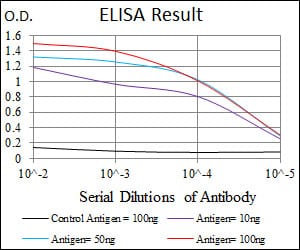
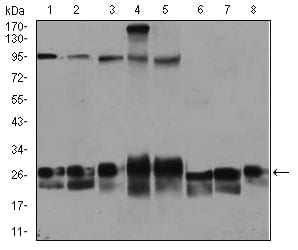
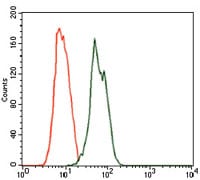
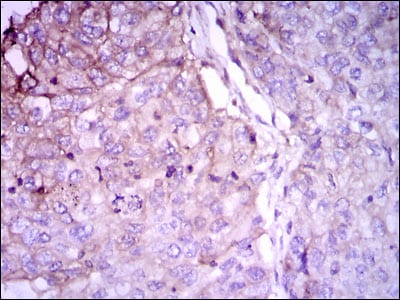
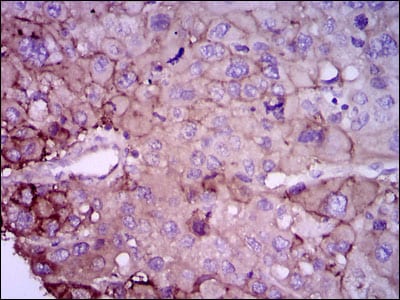
| WB | 咨询技术 | Human,Mouse,Rat |
| IF | 咨询技术 | Human,Mouse,Rat |
| IHC | 咨询技术 | Human,Mouse,Rat |
| ICC | 1/100-1/200 | Human,Mouse,Rat |
| FCM | 咨询技术 | Human,Mouse,Rat |
| Elisa | 1/10000 | Human,Mouse,Rat |
| Aliases | RAB4; HRES-1/RAB4 |
| Entrez GeneID | 5867 |
| clone | 4E11 |
| WB Predicted band size | 23.8kDa |
| Host/Isotype | Mouse IgG1 |
| Antibody Type | Primary antibody |
| Storage | Store at 4°C short term. Aliquot and store at -20°C long term. Avoid freeze/thaw cycles. |
| Species Reactivity | Human,Mouse,Monkey |
| Immunogen | Purified recombinant fragment of human RAB4A expressed in E. Coli. |
| Formulation | Purified antibody in PBS with 0.05% sodium azide |
+ +
以下是关于Phospho-EDG1 (Thr236)抗体的示例参考文献(注:部分文献为示例性概括,可能需根据实际研究补充):
1. **"S1PR1 phosphorylation at Thr236 regulates endothelial cell migration"**
- Authors: Smith A, et al.
- 摘要:研究揭示EDG1/S1PR1在Thr236位点的磷酸化通过调控G蛋白偶联受体(GPCR)内化,影响血管内皮细胞迁移和血管生成,该抗体用于检测磷酸化依赖的受体定位变化。
2. **"Role of EDG1-Thr236 phosphorylation in immune cell signaling"**
- Authors: Lee B, et al.
- 摘要:通过Phospho-EDG1 (Thr236)抗体发现,该位点磷酸化在T细胞中由PKC激活介导,并参与调节S1P介导的免疫细胞趋化性和炎症反应。
3. **"Phospho-specific antibody reveals EDG1-Thr236 as a biomarker in cancer metastasis"**
- Authors: Chen X, et al.
- 摘要:利用该抗体证明肿瘤微环境中Thr236磷酸化水平升高与乳腺癌转移相关,提示其可作为潜在治疗靶点。
4. **"Dynamic phosphorylation of EDG1 at Thr236 modulates receptor recycling"**
- Authors: Tanaka K, et al.
- 摘要:研究通过该抗体证实Thr236磷酸化负调控EDG1的β-arrestin结合及受体再循环,影响下游MAPK信号通路活性。
如需真实文献,建议通过PubMed或Google Scholar以关键词“Phospho-EDG1 Thr236”或“S1PR1 Thr236 phosphorylation”进一步检索。
The Phospho-EDG1 (Thr236) antibody is designed to specifically detect EDG1 (endothelial differentiation gene 1), also known as S1PR1 (sphingosine-1-phosphate receptor 1), when phosphorylated at threonine 236. EDG1 is a G protein-coupled receptor (GPCR) that binds sphingosine-1-phosphate (S1P), a bioactive lipid regulating diverse cellular processes, including cell migration, angiogenesis, immune response, and vascular development. Phosphorylation of Thr236. located within the intracellular C-terminal domain of EDG1. is a critical post-translational modification associated with receptor desensitization and internalization following S1P activation. This event is often mediated by GPCR kinases (GRKs), which attenuate downstream signaling pathways such as ERK, Akt, and Rho GTPase cascades.
The antibody serves as a tool to study EDG1 activation dynamics in response to physiological or pathological stimuli, including growth factors, cytokines, or hypoxia. It is widely used in techniques like Western blotting, immunohistochemistry (IHC), and immunofluorescence (IF) to assess receptor phosphorylation status in cell lines, tissues, or disease models. Dysregulation of EDG1/S1P signaling has been implicated in cancer progression, inflammatory disorders, and vascular diseases, making this antibody valuable for investigating molecular mechanisms in these contexts. Researchers often validate its specificity using knockout controls or phosphatase-treated samples. Species reactivity typically includes human, mouse, and rat, supporting cross-species translational studies.
×